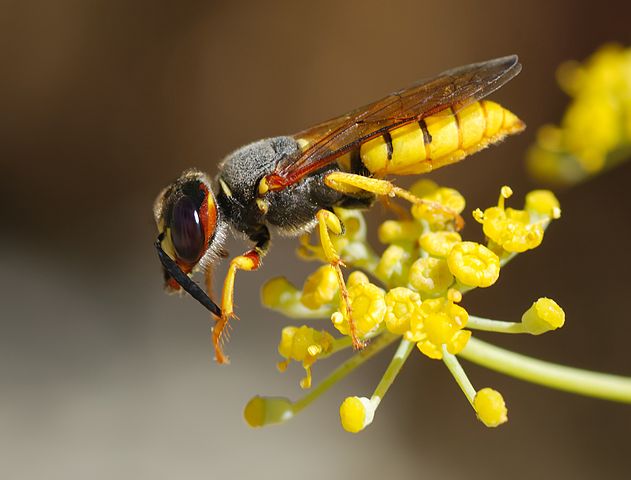Business and Economy
Tiny wasps tasked with saving Indonesia’s cassava crop from devastating pest
BOGOR, Indonesia—They are the size of a pinhead and don’t even pack a sting, but these tiny wasps are cold-blooded killers nonetheless. They work as nature’s SWAT team, neutralizing a pest that threatens to destroy one of the developing world’s most important staple foods: cassava.
The wasps are being released in Indonesia, the latest country threatened by the mealybug. It’s a chalky white insect shaped like a pill that’s been making its way across Southeast Asia’s fields for the past six years. The pest first appeared in Indonesia in 2010. Bogor on the outskirts of Indonesia’s capital Jakarta was ground zero.
But unlike in Thailand, where infestations reached some 250,000 hectares (618,000 acres) of crops grown mostly as part of a huge export business, cassava in Indonesia is a vital local food source second only to rice. That makes the mealybug a serious threat to food security in Indonesia, which already has one of the region’s highest child malnutrition rates.
The parasitic wasps, or Anagyrus lopezi, need the mealybug to survive. Females lay their eggs inside the insect and as the larvae grow, they eat the bug from the inside out, slowly killing it until there’s nothing left but its mummified shell.
On Wednesday, scientists put 3,000 wasps into a secure tent-like habitat in an affected field in Bogor. They will be monitored to see how well they handle local conditions as they multiply to an expected 450,000 within a month. Once a government permit is obtained, the wasps can be released into the wild to start their relentless killing spree.
It’s unclear how much damage mealybugs have already caused to Indonesia’s crops, but infestations have been reported on the main cassava-growing island of Java and in parts of Sumatra, said Kris Wyckhuys, an entomologist at the Colombia-based International Center for Tropical Agriculture, which is helping to co-ordinate the release.
He said the idea is to introduce the wasps early in a pre-emptive strike because the pests if left unchecked can destroy more than 80 per cent of a harvest by sucking the plant’s sap until it withers and dies.
“It is entering into areas where it is expected to cause the biggest yield impact and the biggest impact on food security and on cassava-related livlihoods,” Wyckhuys said.
Cassava farmer Wahyu Hidayat said the pests hit about three hectares of his five hectacre crop four years ago. The leaves started shriveling and falling off the plants that grow up to four meters tall, and no one had ever seen anything like it. It lowered production from five kilos of cassava from one tree down to two kilos.
“It’s really difficult for us,” he said, welcoming the government’s wasp intervention. “As a traditional farmer, we didn’t know how to deal with it.”
Indonesia is one of the world’s top producers of cassava, planting around 1 million hectares (2.5 million acres) a year, half of which is eaten as a staple food across the sprawling archipelago of 240 million people.
The long roots of the shrub-like plant are a major source of carbohydrates and provide an array of nutrients. Like the potato, cassava is a versatile starch that’s an essential part of daily meals across much of the developing world. In Indonesia it is boiled, fried, made into noodles, crackers and even cakes.
Known elsewhere as manioc, tapioca and yucca, it is also made into livestock feed and used as an ingredient in a variety of products worldwide, ranging from lipstick and artificial sweeteners to paint and glucose IV drips.
Portuguese traders first brought the plant from South America centuries ago, and many of the world’s poorest people today depend on it for survival. It grows well in bad soil conditions and doesn’t need much water, making it ideal for hot areas hit by drought.
It is especially important in Africa, which suffered a massive mealybug attack in the 1980s. Wasps were first imported there from Paraguay and released across the continent by airplane. The method was effective, wiping out up to 95 per cent of the bugs in some areas, and has been credited with averting famine and saving $20 billion.
Wyckhuys said the wasps have not created any unintended problems within ecosystems since the so called pink mealybugs only eat cassava and the tiny wasps only eat mealybugs. However, he said it’s impossible to erradicate all of the pests because the wasps must keep some hosts alive in order to keep from dying out themselves.
Mealybugs, or Phenacoccus manihoti, are believed to have hitchhiked into Thailand in 2008, most likely aboard cassava cuttings transported from Africa. But without the wasps to keep them in check, they quickly spread to Laos, Cambodia and Vietnam.
Small releases have been conducted within those countries, and the wasps imported in 2009 to Thailand have also slowly migrated into neighbouring countries.
The wasps have vastly improved the problem in Thailand, the worlds’s largest cassava exporter, but not eliminated it entirely. Several wasp releases are planned in different parts of Indonesia using insects brought from Thailand.






















